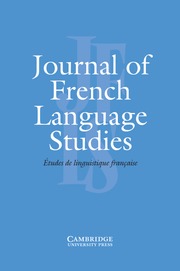Crossref Citations
This article has been cited by the following publications. This list is generated based on data provided by
Crossref.
Johannessen, Janne Bondi
and
Larsson, Ida
2015.
Complexity Matters: On Gender Agreement in Heritage Scandinavian.
Frontiers in Psychology,
Vol. 6,
Issue. ,
Splendido, Frida
2016.
Phonetic-phonological development of early second language French Support for a child second language (cL2) mode of acquisition in phonology.
Revue française de linguistique appliquée,
Vol. Vol. XXI,
Issue. 2,
p.
19.
Lein, Tatjana
Kupisch, Tanja
and
van de Weijer, Joost
2016.
Voice onset time and global foreign accent in German–French simultaneous bilinguals during adulthood.
International Journal of Bilingualism,
Vol. 20,
Issue. 6,
p.
732.
Elias, Vanessa
McKinnon, Sean
and
Milla-Muñoz, Ángel
2017.
The Effects of Code-Switching and Lexical Stress on Vowel Quality and Duration of Heritage Speakers of Spanish.
Languages,
Vol. 2,
Issue. 4,
p.
29.
van Osch, Brechje
and
Sleeman, Petra
2018.
Spanish heritage speakers in the Netherlands: Linguistic patterns in the judgment and production of mood.
International Journal of Bilingualism,
Vol. 22,
Issue. 5,
p.
513.
Montrul, Silvina
2018.
Meaning and Structure in Second Language Acquisition.
Vol. 55,
Issue. ,
p.
149.
Kupisch, Tanja
and
Rothman, Jason
2018.
Terminology matters! Why difference is not incompleteness and how early child bilinguals are heritage speakers.
International Journal of Bilingualism,
Vol. 22,
Issue. 5,
p.
564.
Mairano, Paolo
Bassetti, Bene
Sokolović-Perović, Mirjana
and
Cerni, Tania
2018.
Effects of L1 orthography and L1 phonology on L2 English pronunciation.
Revue française de linguistique appliquée,
Vol. Vol. XXIII,
Issue. 1,
p.
45.
Putnam, Michael T.
Kupisch, Tanja
and
Pascual y Cabo, Diego
2018.
Bilingual Cognition and Language.
Vol. 54,
Issue. ,
p.
251.
Granget, Cyrille
Dat, Marie-Ange
Cuet, Christine
El Haj, Pascale
Albochi, Fatima
Allawama, Ashraf
Neveu, F.
Harmegnies, B.
Hriba, L.
and
Prévost, S.
2018.
Effets de l'âge d’immersion sur la compréhension initiale d’expressions modales épistémiques en français L2.
SHS Web of Conferences,
Vol. 46,
Issue. ,
p.
10005.
Torregrossa, Jacopo
and
Bongartz, Christiane
2018.
Teasing Apart the Effects of Dominance, Transfer, and Processing in Reference Production by German–Italian Bilingual Adolescents.
Languages,
Vol. 3,
Issue. 3,
p.
36.
Filipović, Luna
and
Hawkins, John A
2019.
The Complex Adaptive System Principles model for bilingualism: Language interactions within and across bilingual minds.
International Journal of Bilingualism,
Vol. 23,
Issue. 6,
p.
1223.
Montrul, Silvina
2019.
The Handbook of Informal Language Learning.
p.
57.
Bayram, Fatih
Rothman, Jason
Iverson, Michael
Kupisch, Tanja
Miller, David
Puig-Mayenco, Eloi
and
Westergaard, Marit
2019.
Differences in use without deficiencies in competence: passives in the Turkish and German of Turkish heritage speakers in Germany.
International Journal of Bilingual Education and Bilingualism,
Vol. 22,
Issue. 8,
p.
919.
Zyzik, Eve C.
and
Sanchez, Ruben A.
2019.
Beyond accuracy: Heritage speakers’ performance on two kinds of acceptability judgment tasks.
Applied Psycholinguistics,
Vol. 40,
Issue. 03,
p.
645.
Karayayla, Tuğba
and
Schmid, Monika S.
2019.
First Language Attrition as a Function of Age at Onset of Bilingualism: First Language Attainment of Turkish–English Bilinguals in the United Kingdom.
Language Learning,
Vol. 69,
Issue. 1,
p.
106.
Lohndal, Terje
Rothman, Jason
Kupisch, Tanja
and
Westergaard, Marit
2019.
Heritage language acquisition: What it reveals and why it is important for formal linguistic theories.
Language and Linguistics Compass,
Vol. 13,
Issue. 12,
Montrul, Silvina
2019.
Teachability and Learnability across Languages.
Vol. 6,
Issue. ,
p.
237.
Daskalaki, Evangelia
Chondrogianni, Vasiliki
Blom, Elma
Argyri, Froso
and
Paradis, Johanne
2019.
Input effects across domains: The case of Greek subjects in child heritage language.
Second Language Research,
Vol. 35,
Issue. 3,
p.
421.
Schmid, Monika S.
and
Karayayla, Tuğba
2020.
The Roles of Age, Attitude, and Use in First Language Development and Attrition of Turkish–English Bilinguals.
Language Learning,
Vol. 70,
Issue. S1,
p.
54.

